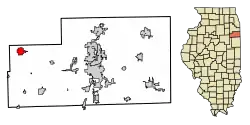Essex, Illinois
Essex is a village in Kankakee County, Illinois, United States. The population was 802 at the 2010 census,[2] up from 554 at the 2000 census. It is included in the Kankakee-Bradley, Illinois Metropolitan Statistical Area.
Essex, Illinois | |
|---|---|
 Location of Essex in Illinois | |
.svg.png.webp) Location of Illinois in the United States | |
| Coordinates: 41°10′39″N 88°11′29″W | |
| Country | United States |
| State | Illinois |
| County | Kankakee |
| Township | Essex |
| Area | |
| • Total | 2.35 sq mi (6.09 km2) |
| • Land | 2.33 sq mi (6.03 km2) |
| • Water | 0.03 sq mi (0.07 km2) |
| Elevation | 589 ft (180 m) |
| Population (2020) | |
| • Total | 841 |
| • Density | 361.41/sq mi (139.54/km2) |
| Time zone | UTC-6 (CST) |
| • Summer (DST) | UTC-5 (CDT) |
| ZIP code | 60935 |
| Area codes | 815 & 779 |
| FIPS code | 17-24452 |
| GNIS ID | 2398841 |
| Website | villageofessex |
History
Ira M. Lish (1855–1937), Illinois politician and lawyer, was born in Essex.[3]
Unlike earlier underground coal mines exploited by coal miners living in the now lost, nearby settlements of Tracy, Oklahoma and Clarke City, open-pit mines were established near Essex.[4]
Geography
Essex is located in western Kankakee County at 41°10′39″N 88°11′29″W (41.177620, -88.191338).[5] It is 19 miles (31 km) northwest of Kankakee, the county seat, and 7 miles (11 km) south of Braidwood.
According to the 2010 census, Essex has a total area of 2.506 square miles (6.49 km2), of which 2.48 square miles (6.42 km2) (or 98.96%) are land and 0.026 square miles (0.07 km2) (or 1.04%) are water.[6]
Demographics
| Census | Pop. | Note | %± |
|---|---|---|---|
| 1890 | 266 | — | |
| 1900 | 385 | 44.7% | |
| 1910 | 342 | −11.2% | |
| 1920 | 278 | −18.7% | |
| 1930 | 207 | −25.5% | |
| 1940 | 211 | 1.9% | |
| 1950 | 284 | 34.6% | |
| 1960 | 328 | 15.5% | |
| 1970 | 364 | 11.0% | |
| 1980 | 463 | 27.2% | |
| 1990 | 482 | 4.1% | |
| 2000 | 554 | 14.9% | |
| 2010 | 802 | 44.8% | |
| 2020 | 841 | 4.9% | |
| U.S. Decennial Census[7] | |||
As of the 2000 United States Census,[8] there were 554 people, 199 households, and 160 families residing in the village. The population density was 272.9 inhabitants per square mile (105.4/km2). There were 208 housing units at an average density of 102.5 per square mile (39.6/km2). The racial makeup of the village was 98.38% White, and 1.62% from two or more races.
There were 199 households, out of which 36.7% had children under the age of 18 living with them, 68.3% were married couples living together, 6.0% had a female householder with no husband present, and 19.1% were non-families. 16.1% of all households were made up of individuals, and 9.0% had someone living alone who was 65 years of age or older. The average household size was 2.78 and the average family size was 3.10.
In the village 25.3% were under the age of 18, 11.2% were from 18 to 24, 25.5% were from 25 to 44, 26.2% were from 45 to 64, and 11.9% were 65 years of age or older. The median age was 37 years. For every 100 females, there were 109.8 males. For every 100 females age 18 and over, there were 106.0 males.
The median income for a household in the village was $50,238, and the median income for a family was $51,118. Males had a median income of $40,577 versus $24,531 for females. The per capita income for the village was $18,686. About 5.5% of families and 5.8% of the population were below the poverty line, including 2.0% of those under age 18 and none of those age 65 or over.
References
- "2020 U.S. Gazetteer Files". United States Census Bureau. Retrieved March 15, 2022.
- "Geographic Identifiers: 2010 Demographic Profile Data (G001): Essex village, Illinois". American Factfinder. U.S. Census Bureau. Retrieved February 14, 2019.
- 'Illinois Blue Book 1911-1912,' Biographical Sketch of Ira M. Lish, p. 204-205
- Klasey, Jack (June 18, 2016). "These Kankakee County towns vanished with hardly a trace". Daily Journal (News article). Kankakee, IL. Archived from the original on May 6, 2020. Retrieved May 6, 2020.
In the early 1880s, three towns sprung up to house miners exploiting a seam of coal...Unlike the later open-pit mines near Essex, these mines were shafts bored 90 to 100 feet into the ground...They lived in the towns of Tracy, Oklahoma and Clarke City.
- "US Gazetteer files: 2010, 2000, and 1990". United States Census Bureau. February 12, 2011. Retrieved April 23, 2011.
- "G001 - Geographic Identifiers - 2010 Census Summary File 1". United States Census Bureau. Archived from the original on February 13, 2020. Retrieved August 3, 2015.
- "Census of Population and Housing". Census.gov. Retrieved June 4, 2015.
- "U.S. Census website". United States Census Bureau. Retrieved January 31, 2008.